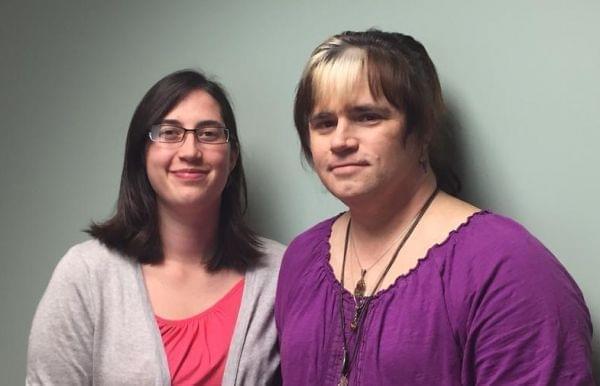Services for Transgender Patients Expanding, Still Lacking

Bethany Hillman (left) and Darcia Ostling (right) met at a health forum hosted by the Peoria Transgender Society. Hillman works at Planned Parenthood and helped advocate for transgender health services after hearing stories from people like Ostling, who had to travel to Chicago for treatment. Cass Herrington / Peoria Public Radio
Planned Parenthood health centers in Peoria, Pekin and Bloomington added services in August for transgender patients. Members of the transgender community welcome the news, but say there’s still a void in the treatment that’s available.
Darcia Ostling started her transition six years ago, “From who I was into who I am, who I truly am,” Ostling said.
At the time, Ostling didn’t have a car. She’d take time off work, pack a suitcase and hop on a train or bus to Chicago to begin her treatment. She had to make separate trips for consultations, procedures, follow ups. She says the cost of travel, hotel, and being away from work all started to add up.
“After a period, I was spending so much money,” Ostling said. “That’s why I decided to approach Bethany, to see if they could instead of me going up to Chicago.”
Bethany Hillman is an enrollment specialist at Planned Parenthood. She and Ostling met last year during a Transgender Society of Peoria forum on health services. Hillman was struck by the conversations she heard about the lack of options for transgender people in the Peoria area.
“There’s a huge need and these people deserve to have access to care, just like everyone else, so that’s what started the ball rolling,” Hillman said.
After several months of continued conversations with the Transgender Society, Planned Parenthood launched services, like hormone replacement therapy and counseling, to transitioning patients. Not just in Peoria, but also at its clinics in Pekin, Bloomington and Springfield.
“There’s a lot of other people like me who need the services down here, rather than transport them to St. Louis or Chicago or wherever the clinic is,” Ostling said.
The Peoria Transgender Society and several health providers together estimate there are between 1,000-1,500 transgender people living in the Peoria area. The first census numbers that will count transgender people, as such, come out next year.
But within that population, like any subgroup, there’s diversity, and so far, Planned Parenthood’s services don’t cover the full spectrum of medical needs in the transgender population. For instance, those who want gender reassignment surgery or a doctor trained in specialties, like OBGYN, still have to travel outside of the area.
“To find a provider is mostly through word of mouth, you have to know somebody who knows somebody, and that's how a lot of my clients find me,” Shelly Smith, a licensed marriage and family therapist, said.
“As a clinician, initially, we just check the boxes of what we’re willing to work with or what we can work with, and when I clicked the initial box, I really didn’t know what that meant completely,” Smith said. “It’s been a steep learning curve.”
Smith took it upon herself to research and attend a World Professional Association for Transgender Health, or WPATH, conference to get more versed.
“Through that network of people, I found people all over the US that I can collaborate with," Smith said. "And locally in Peoria I've been finding providers, I found a couple of physicians and then I found some med students here recently who are interested in learning as well.”
Medical Students, like Aran Yoo.
“People are starting to realize that not only to people want to transition, they want to transgender in very different ways. Some people may want to go through surgery, some people might not. Some people might want to take hormones, some people might not.” Yoo said. “Medicine is catching up with that."
Yoo is a third year student at the University of Illinois College of Medicine in Peoria. But in the area of transgender issues, Yoo may be offering some education to her teachers.
“I’ve spoken up, not a lot, but a couple of times, when I’m interacting with faculty about what terms to use, for example,” Yoo said.
Yoo says she’s noticed a sort of cultural shift going on in medicine. As it stands right now, physicians who are considered “trans friendly” are known by word of mouth, or listed in the Peoria Transgender Society’s directory. But Yoo says the doctors and faculty she's working with seem receptive to taking bolder steps, like professional training through organizations like WPATH.
“I’ve heard from several physicians that all of the sudden, they have this person that comes in, and they have a lot of different issues going on, and they [doctors] don’t exactly know how to go about it,” Yoo said. “Having that certification will make physicians feel a lot more comfortable and competent interacting with transgender patients.”
WPATH offers several courses, and even cadaver labs, for providers seeking specific information. But Yoo says, there are even simpler ways to move the conversation forward.
“Having doctors familiar with what terms to use, and how to just go up and ask a person who is transgender 'what pronouns do you prefer?' That's a very simple thing that can warm up the environment really quickly in a patient interaction,” Yoo said.
And if students, and doctors, are more comfortable, Yoo says, patients will be better served.
Links
- Being Transgender In Illinois
- Breaking Down Barriers - TRANSGENDER
- U.S. Announces Protections For Transgender Workers
- Obama Gives Protection To Gay, Transgender Workers
- Parenting a Transgender Child
- Nation’s First Transgender Housing Center Opens in Chicago
- After Years of Hiding, ‘Walking in Love’ As Transgender
- Peoria Transgender Society
- Central Illinois PRIDE Health Center
- Transgender Health Services at Planned Parenthood of Illinois

